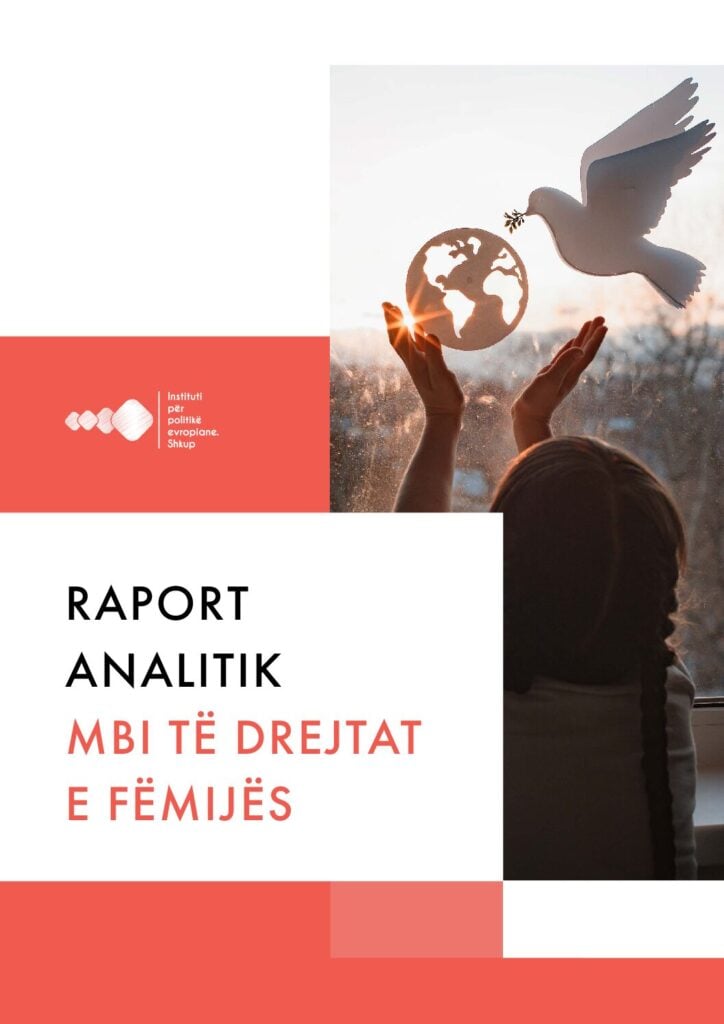 Të drejtat e fëmijës janë një komponent thelbësor i detyrimeve ndërkombëtare për të drejtat e njeriut të Maqedonisë së Veriut dhe po pozicionohen gjithnjë e më shumë si një pikë referimi për qeverisjen demokratike dhe reformat institucionale në kuadër të procesit të anëtarësimit në BE. Si një vend kandidat, Maqedonia e Veriut pritet të sigurojë përputhje të plotë me Konventën e Kombeve të Bashkuara për të Drejtat e Fëmijës (KKDF) dhe Protokollet e saj Shtesë, si dhe të dëshmojë përparim të matshëm në këtë fushë në kuadër të Kapitullit 23—Gjyqësori dhe të Drejtat Themelore të acquis të BE-së. Njëkohësisht, gjatë ciklit të katërt të Rishikimit Periodik Universal (RPU), vendi mori disa rekomandime të detajuara për forcimin e mbrojtjes ligjore, garantimin e zbatimit të saj dhe adresimin e mangësive sistemike në fushën e të drejtave të fëmijëve.
Të drejtat e fëmijës janë një komponent thelbësor i detyrimeve ndërkombëtare për të drejtat e njeriut të Maqedonisë së Veriut dhe po pozicionohen gjithnjë e më shumë si një pikë referimi për qeverisjen demokratike dhe reformat institucionale në kuadër të procesit të anëtarësimit në BE. Si një vend kandidat, Maqedonia e Veriut pritet të sigurojë përputhje të plotë me Konventën e Kombeve të Bashkuara për të Drejtat e Fëmijës (KKDF) dhe Protokollet e saj Shtesë, si dhe të dëshmojë përparim të matshëm në këtë fushë në kuadër të Kapitullit 23—Gjyqësori dhe të Drejtat Themelore të acquis të BE-së. Njëkohësisht, gjatë ciklit të katërt të Rishikimit Periodik Universal (RPU), vendi mori disa rekomandime të detajuara për forcimin e mbrojtjes ligjore, garantimin e zbatimit të saj dhe adresimin e mangësive sistemike në fushën e të drejtave të fëmijëve.
Ky dokument shqyrton shkallën në të cilën vendi e ka përafruar kuadrin e të drejtave të fëmijëve me rekomandimet e RPU-së dhe Raportin e Progresit të Komisionit Evropian për vitin 2024, me fokus të veçantë në përparimin e arritur në forcimin e kuadrit ligjor, politik dhe institucional. Analiza i kushton vëmendje të veçantë çështjeve të aksesit, barazisë dhe mbrojtjes – veçanërisht për fëmijët nga grupet e margjinalizuara dhe të cenueshme – duke evidentuar fushat kryesore ku zbatimi mbetet i pjesshëm, i fragmentuar ose i vonuar.
Analiza ndjek grupet tematike të përcaktuara në udhëzimet e raportimit të Komitetit të OKB-së për të Drejtat e Fëmijëve, duke ofruar një vlerësim të strukturuar dhe krahasues. Çdo seksion fillon me një përmbledhje të rekomandimeve përkatëse nga RPU dhe Raporti i Progresit i BE-së, të cilat shërbejnë si pika referimi për vlerësimin e gjendjes aktuale të zbatimit. Fushat kryesore tematike të përfshira janë:
- Masat e Përgjithshme të Zbatimit, duke u përqendruar në ratifikimin e instrumenteve ndërkombëtare, strategjitë kombëtare, mekanizmat e koordinimit dhe rolin e institucioneve të pavarura;
- Të Drejtat dhe Liritë Civile, me theks në regjistrimin e lindjeve;
- Dhuna ndaj fëmijëve, duke përfshirë kornizat strategjike, praktikat e dëmshme dhe mekanizmat e mbrojtjes institucionale;
- Arsimi, që mbulon përfshirjen, heqjen e segregacionit, reformat ligjore dhe zhvillimin e arsimit dhe trajnimit profesional; dhe
- Masa të Veçanta Mbrojtëse, që adresojnë trafikimin dhe drejtësinë për fëmijët.
Ky dokument synon të ofrojë si një përshkrim faktik ashtu edhe një analizë kritike të zhvillimeve kombëtare në këto fusha. Ai thekson progresin, identifikon sfidat strukturore dhe operacionale dhe propozon rekomandime praktike për të mbështetur një përafrim më të fortë me RPU-në dhe kërkesat e BE-së.
